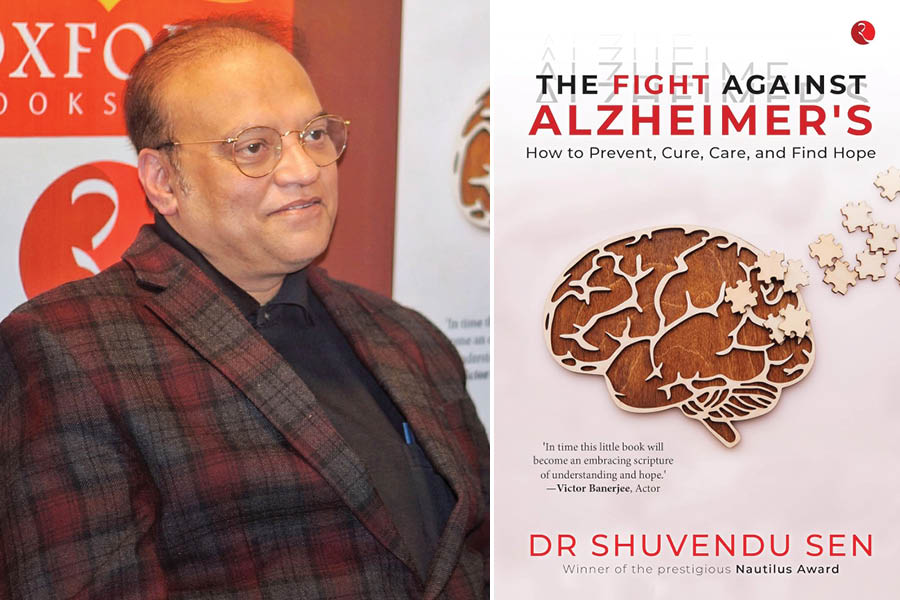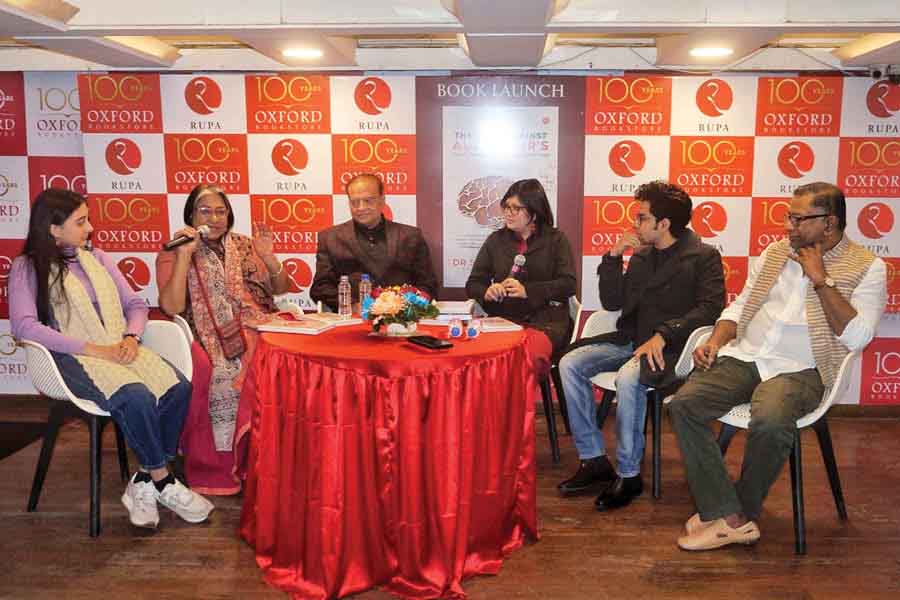
Billions of people are living with undercover Alzheimer’s; it is a pandemic: Shuvendu Sen
Saying ‘breakfast’ instead of ‘bread, butter and omelette’ can be the first sign, says the author of ‘The Fight Against Alzheimer’s’
 |
| Shuvendu Sen’s book, ‘The Fight Against Alzheimer’s’, intends to handhold patients and caregivers into dealing with a difficult disease: Soumyajit Dey/Amazon |
PRIYAM MARIK | TT | 02.02.24 :
Our identities are contingent on our memories. Strip away our past and our present and our future become a blur. This is what makes Alzheimer’s, a killer of memory, one of the most pernicious diseases affecting human beings. Slowly but surely, Alzheimer’s makes us incapable of remembering, reducing identities to castles of sand, taken down by every onrushing wave of a seemingly incurable illness.
In The Fight Against Alzheimer’s (Rupa Publications), Shuvendu Sen, a US-based physician who is a recipient of the Nautilus Award alongside recognitions from the United Nations and the American College of Physicians, makes a heartfelt case for paying greater attention to Alzheimer’s. Terming it a pandemic, Sen argues that Alzheimer’s has no age, has hard to detect symptoms and possesses no definitive cure. But he also offers hope by suggesting “practical steps through emotional hands” by which Alzheimer’s can be checked, possibly controlled.
An author of short stories, poems and film scripts as well as a prolific volunteer in medical programmes in the US, Sen, who is currently the vice chair of research at the Jersey Shore Medical Center in New Jersey, spoke to My Kolkata at his South City home in Kolkata on how to combat Alzheimer’s. Edited excerpts from the conversation follow.
My Kolkata: Before we dive into the book, tell us a bit about your connection to Kolkata and how and why you went to the US.
Shuvendu Sen: I was born and brought up in Kolkata, and grew up in an academic environment. I had a confluence of science and the arts, because my dad was in science and my mom was in the arts. I gave my joint entrance exam and got into medicine. Even though I wanted to be a doctor, I had also started writing from an early age. My earliest stories were about my patients (when Sen was at the Bankura Medical College and the Calcutta National Medical College). Thereafter, I wanted to do research, which is why I went to the US, where I completed two Master’s degrees — one in medical microbiology and the other in pharmacology and toxicology — from Long Island University in Brooklyn. Once I passed my medical exams in the US, I started working as a resident doctor while also continuing my writing pursuits.
How Anupam Kher inspired ‘The Fight Against Alzheimer’s’
What was the genesis of your latest book?
In 2017, I had written a book called Why Buddha Never Had Alzheimer’s (2017), which focused on the disease management of Alzheimer’s. The book did well and Bhagat Singh Koshyari, governor of Maharashtra at the time, wanted to make a documentary on it. The film was made (and received recognition from the United Nations) with Victor Banerjee generously agreeing to give the voice-over. It even featured a completely spontaneous interview with Anupam Kher. It was Kher who had told me that I should follow up this book with another one, which can handhold patients of Alzheimer’s and their caregivers regarding how to deal with the disease using everyday language. In many ways, that formed the inspiration behind The Fight Against Alzheimer’s.
What was the idea behind having a book trailer?
Alzheimer’s is a household disease, which is why I wanted household names to raise awareness about it. I didn’t want my message to be cut and dry and emanating only from the medical community. We’re becoming a drug-dependent society. Medicine is going backwards. We’re letting diseases happen and it’s only then that the pharmaceutical industry is kicking into action. To change all this, we need powerful stories, which can be communicated effectively by powerful storytellers. That’s why I wanted people who can connect with other people — the likes of Victor Banerjee, Anupam Kher, Parambrata Chattopadhyay, among others — to be a part of the book trailer.
‘Loss of memory, loss of orientation of time, place and person….’
To get the basics in place, what exactly is Alzheimer’s, how common is it and how is it similar to and different from dementia?
There are multiple types of dementia, which can happen from Parkinson’s disease, from stroke, from something called Lewy body dementia (related to abnormal deposits of a protein called alpha-synuclein or Lewy bodies), among others. Alzheimer’s is one type of dementia. In it, there’s loss of memory, but there’s also loss of orientation of time, place and person. These are accompanied by lack of reasoning and lack of recognition. This is why I always advise utmost care when unclothing Alzheimer’s patients (for a bath or other everyday hygiene-related things), because they may not be able to recognise their closest family members. After all, even with Alzheimer’s, a sense of dignity often remains intact among the patients.
In terms of numbers, about five million Indians are affected by Alzheimer’s. But that’s a gross undercount. As is WHO’s figure of 55 million Alzheimer’s patients in the world. I think there are billions of people living with undercover Alzheimer’s. So much so that I’ve called it a pandemic. With Covid-19, documentation was easy. But Alzheimer’s is a pandemic where documentation and detection are very difficult.
Not being able to remember names of common objects; losing one’s sense of smell
What are the early tell-tale signs when it comes to Alzheimer’s?
Early tell-tale signs usually involve losing articulation and not being able to remember words. This isn’t to do with forgetting names of places or people. So, it isn’t concerned with proper nouns. It’s to do with failing to recall names of common objects, such as not knowing what to call a tree or being unable to say “bread, butter and omelette” and simply saying ‘breakfast’ instead. A tendency to avoid detailing in words is a sign of Alzheimer’s, and it can set in as early as 20 years before someone actually gets diagnosed. Alzheimer’s also has a tendency to start in the bathroom, as it’s connected to a decrease in the sense of smell. If you can’t smell your favourite body lotion or soap properly, that’s a concern. Another concern is multiple awakenings at night even though nothing apparently stressful is taking place the next day. In fact, sleep deprivation is both a cause and effect of Alzheimer’s.
In this context, let me be clear that Alzheimer’s isn’t an age-specific disease. While it might get aggravated beyond the age of 70, it can start in the early 50s or even in the late 40s in certain cases.
Doing a CT scan of the brain can help early on and medication can potentially make a difference in the early stages, but there are no foolproof drugs for Alzheimer’s yet.
The role of motion, meditation and music in dealing with Alzheimer’s
How can one keep Alzheimer’s at bay through everyday activities or mitigate it even when it starts to creep in?
It all starts with awareness, with knowing that Alzheimer’s can happen to anybody. Even if you’re an intellectually oriented person who is constantly reading and thinking, you’re not immune to Alzheimer’s. We’ve noticed that in Alzheimer’s, the left hippocampus (which deals with learning and memory) begins to atrophy. But the shrinkage can stop if one is involved in constant movement. I don’t like to use the word ‘exercise’, as I prefer the word ‘motion’. Motion is very important in dealing with Alzheimer’s. If you can’t run, walk. If you can’t walk, move your arms or legs. If you can blink, wink.
Social isolation has been found to be one of the biggest causes of Alzheimer’s. Which is why I suggest that if you don’t have friends, talk to yourself. Stand in front of the mirror or write a love letter to yourself. Meditation is also very useful, as a breathing technique. It helps to de-stress the body (stress appears to affect the same parts of the brain as Alzheimer’s) and increases the blood flow to the brain manifold.
A Mediterranean or a DASH (Dietary Approaches to Stop Hypertension) diet can help. Coffee and walnuts seem to have a positive impact. As do music and other kinds of art. One of my Alzheimer’s patients in the US, Gloria Sanchez, was in a semi-coma on Christmas Eve one year. On hearing the Joy to the World ringtone on my phone, she briefly came out of the coma and asked me if it’s Christmas. That’s the power of art in dealing with Alzheimer’s.
While we have established that Alzheimer’s affects memory and cognition, what are the parts/kinds of memory that often remain unharmed?
There are different kinds of memories — semantic memory, emotional memory, procedural memory, among others. In Alzheimer’s patients, procedural memory tends to be intact. If someone has done something such as making their bed or stitching clothes or other seemingly mundane things for large parts of their life, they will continue to do so even with Alzheimer’s. This is something we must take advantage of. Procedural memory can be used to sharpen other kinds of memories. For instance, Alzheimer’s patients often lose their way, even when it comes to moving around in their own house. We can make remembering directions easier for them by converting it into a procedure, using colours as well as sign therapy.
Can Artificial Intelligence (AI) be a gamechanger in relation to Alzheimer’s?
I won’t use the word gamechanger. Because a proper understanding of Alzheimer’s eludes us. Yes, AI could be a potential caregiver, but it can also be a risk in the absence of deep knowledge and understanding about Alzheimer’s, since Alzheimer’s has overlapping symptoms with other conditions and diseases.
Lastly, you mention in your book that the caregivers of Alzheimer’s patients are most in danger of getting Alzheimer’s themselves. Why so and how can this be prevented?
Caregivers are the most vulnerable; they are undercover Alzheimer’s patients. This is because it’s extremely hard to be a caregiver to an Alzheimer’s patient. Cancer patients are easier to take care of. But with Alzheimer’s, the patient loses sense of who is caring for them and what they mean to each other. It creates a one-sided relationship, where there is little to no gratitude or acknowledgement from the patient’s end. It also requires a lot of patience on the caregiver’s part, since they are taking care of a virtually functionless entity. That’s why caregiver burnout is quite common.
The way to prevent this is to provide caregiver support, be it through helplines, communities, group activities or other forms of engagement. The key is to treat caregivers as potential patients.


0 Response to " Billions of people are living with undercover Alzheimer’s; it is a pandemic: Shuvendu Sen"
Post a Comment
Disclaimer Note:
The views expressed in the articles published here are solely those of the author and do not necessarily reflect the official policy, position, or perspective of Kalimpong News or KalimNews. Kalimpong News and KalimNews disclaim all liability for the published or posted articles, news, and information and assume no responsibility for the accuracy or validity of the content.
Kalimpong News is a non-profit online news platform managed by KalimNews and operated under the Kalimpong Press Club.
Comment Policy:
We encourage respectful and constructive discussions. Please ensure decency while commenting and register with your email ID to participate.
Note: only a member of this blog may post a comment.